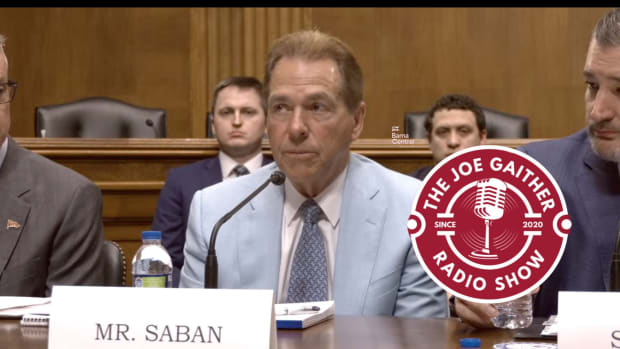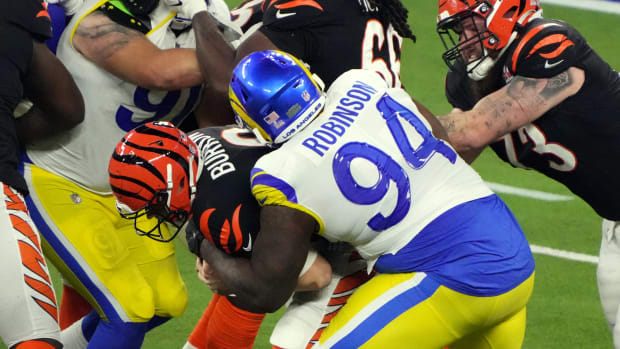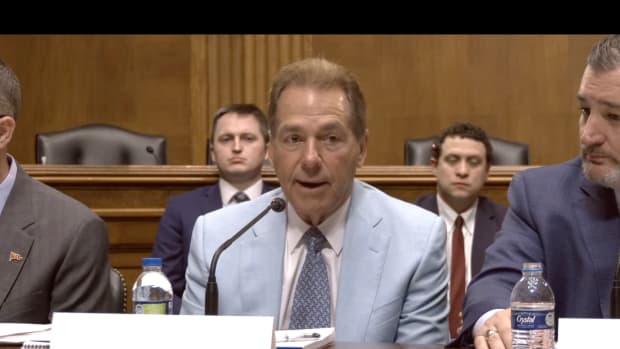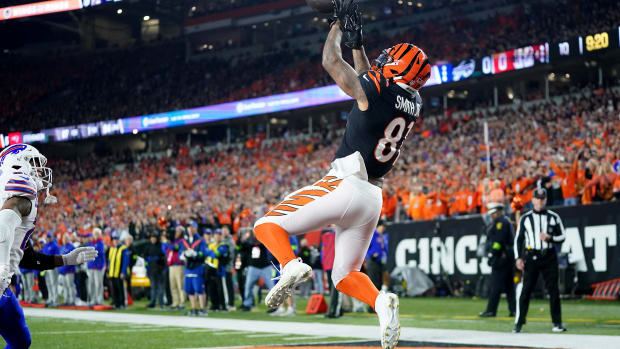
The Coaching Legacy at Texas Begins With One Name: Darrell Royal
University of Alabama fans are already well familiar with the current Texas head coach as Steve Sarkisian was the Crimson Tide's offensive coordinator during last season's undefeated national championship run.
The school didn't even wait for the title game against Ohio State to announce having hired the 2020 Broyles Award winner for best assistant coach in college football. He had previously served as the head coach at Southern California and Washington, and offensive coordinator of the NFL's Atlanta Falcons.
During his two full season in Tuscaloosa, Alabama scored 35 or more points in 24 straight games, the longest streak in major college football history. It was snapped in the College Football Playoff semifinals, when Alabama soundly defeated Notre Dame 31-14, and for an encore the Crimson Tide defeated Ohio State 52-24.
Alabama averaged 48.5 points per game in 2020, including a league record five 50-point performances against SEC opponents. It also scored 52 against Florida in the SEC Championship Game.
Consequently, Crimson Tide offensive players won the Hesiman Trophy, Walter Camp Award, Maxwell Award, Biletnikoff Award, Doak Walker Award, Davey O'Brien Award, Outland Trophy, Rimington Award and the Joe Moore line for the most outstanding offensive line unit.
However, when it comes to Texas Longhorns history, one name clearly stands out, with two others also in the College Football Hall of Fame.
Darrell Royal
A former Oklahoma All-American quarterback under Bud Wilkinson, Royal first was a head coach at Mississippi State (1954-1955) and Washington (1956) before taking over the Longhorns in 1957.
Royal is credited with two innovations that set Texas out in front of the rest of the nation in offensive strategy: his "Flip-Flop Winged-T" in 1962 and the Wishbone in 1968 — which he taught to Paul "Bear" Bryant.
His Texas teams won 11 Southwest Conference championships.
He led the Longhorns to 16 bowls, and to national championships in 1963, 1969 and 1970.
Royal's 23-year career record of 184-60-5 reflected his immense success on the field. The Longhorns finished in the Top 10 eleven times, had 77 players win All-SWC honors, while 26 were named All-Americans.
Royal was twice named Coach of the Year by the American Football Coaches Association, and he won the same distinction twice from the Football Writers of America.
Royal retired as the Longhorn head coach after the 1976 season, but stayed on as athletic director until 1980.
Mack Brown
Brown is already inducted into the College Football Hall of Fame even though he's still coaching, doing a second stint at North Carolina (1988-97 the other).
However, it was at Texas from 1998-2013 where Brown enjoyed his greatest success including winning the 2005 national championship.
His 76.7 percent winning percentage is considered a program landmark, and his 158 career wins are second only to Royal.
The 2009 Big 12 Coach of the Year won two conference titles (2005, 2009), four Big 12 South Division titles and led the Longhorns to another appearance in the BCS National Championship following the 2009 season, where Texas lost to Nick Saban and Alabama at the Rose Bowl.
A two-time National Coach of the Year at Texas, Brown won more than 10 games in nine consecutive seasons, and his teams posted 13 top 25 finishes, including seven in the top 10.
He posted a Big 12 record 21 consecutive conference wins from 2004-06, and he led the Longhorns to bowl games in all but one season, winning 10.
Before he came out of retirement to rejoin the Tar Heels, Brown had coached 37 first-team All-Americans, six Academic All-Americans, 110 first team all-conference selections and 11 conference Players of the Year.
He also coached Heisman Trophy winner Ricky Williams, and four NFF National Scholar-Athletes, including Campbell Trophy winners Sam Acho and Dallas Griffin.
Dana Bible
If you ever want to start an argument between a Texas and Texas A&M fan, ask them which school has a better claim on Bible, who had a tremendous coaching career at both schools.
His resume included Mississippi College (1913-1915), LSU (1916), Texas A&M (1917, 1919-28), Nebraska (1926-36), and Texas (1937-46), for a combined record of 198-72-23 over 33 years.
At Texas, Bible went 55-13-2 over his last seven seasons as a head coach. He also served on the National Collegiate Football Rules Committee for 25 years, and was president of the American Football Coaches Association.
Texas Longhorns Head Coaches
Name Years; Records
No coach 1893 4-0-0
R.D. Wentworth 1894; 6-1-0
Frank Crawford 1895; 5-0-0
Harry Robinson 1896; 4-2-1
Mike Kelly 1897; 6-2-0
David F. Edwards 1898; 5-1-0
Maurice G. Clarke 1899; 6-2-0
Shy Thompson 1900-01; 14-2-1
J.B. Hart 1902; 6-3-1
Ralph Hutchinson 1903-05; 16-7-2
H.R. Schenker 1906; 9-1-0
W.E. Metzenthin 1907-08; 11-5-1
Dexter Draper 1909; 4-3-1
W.S. Wasmund 1910; 6-2-0
Dave Allerdice 1911-15; 33-7-0
Eugene Van Gent 1916; 7-2-0
Bill Juneau 1917-19; 19-7-0
Berry Whitaker 1920-22; 22-3-1
E.J. Stewart 1923-26; 24-9-3
Clyde Littlefield 1927-33; 44-18-6
Jack Chevigny 1934-36; 13-14-2
D.X. Bible 1937-46; 63-31-3
Blair Cherry 1947-50; 32-10-1
Ed Price 1951-56; 33-27-1
Darrell Royal 1957-76; 167-47-5
Fred Akers 1977-86; 86-31-2
David McWilliams 1987-91; 31-26-0
John Mackovic 1992-97; 41-28-2
Mack Brown 1998-2013; 158-48-0
Charlie Strong 2014-16; 16-21-0
Tom Herman 2017-20; 23-13-0
Steve Sarkisian 2021-present 5-7
Texas Longhorns Coaching Awards
Paul W. “Bear” Bryant Award: Mack Brown 2005
Eddie Robinson Award: Darrell Royal 1961, 1963
Bobby Dodd Award: Mack Brown 2008
AFCA: Darrell Royal 1963, 1971 (tie with Charle McClendon, LSU);
Frank Broyles Assistant Coach of the Year: Greg Davis, 2005
Texas Longhorns Assistant Coaches
Ron Aiken 1997, Fred Akers 1966-74, Duane Akina 2001-2013, Shorty Alderson 1925-34, ’45-46, Lynn Amedee 1989-91, Major Applewhite, 2008-13, Chris Ash, 2020
Buster Baebel 1935, Jeff Banks 2021-present, Nelson Barnes 1994-96, Tim Beck 2017-19, Vance Bedford 2014-16, Emory Bellard 1967-71, Steve Bernstein 1992-97, Ed Bluestein 1924, Rob Boras 1997, Jay Boulware 2020, Phil Bounds 1981, Bob Boyd 1989-91, Don Breaux 1975-76, Tim Brewster 1998-2001, Steve Brickey 1987-91, B.D. Bryan 1921, Cleve Bryant 1992-94, Jack Burns 1976
Dan Campbell 1982-86, Mike Campbell 1957-76, Bruce Chambers 1998-2014, Blair Cherry 1937-46, Gene Chizik 2005-06, Jeff Choate 2021-present, Tashard Choice 2021-present, James Clay 1916, Russell Coffee 1960-66, Andre Coleman, 2020-present; Scott Conley 1982-85, Pat Culpepper 1963-64, Eck Curtis 1946-54, Homer Curtiss 1900-05
Ken Dabbs 1973-82, Gene Dahlquist 1992-97, Gary Darnell 1992-96, Art Davis 1963, Bo Davis 2011-13, 2021-present, Greg Davis 1998-2010, Mike Deal 1995-97, Manny Diaz 2011-13, John Dibrell 1934-36, Billy Disch 1911-12, Tim Doerr 1969-76, Darryl Drake 1998-2003, Stan Drayton 2017-21, Bill DuBose 1951-54, Spike Dykes 1972-76
Bill Ellington 1959-73, Tom Ellis 1966-69, Ox Emerson 1951-56, H.J. Ettlinger 1913-19, Sonny Everett 1976
Fyle Flood 2021-present, Tommy Ford 1965, Leon Fuller 1977-81, ’89-93
Blake Gideon 2021-present, Sterlin Gilbert 2016, Oscar Giles 2005-13, 2017-20, Bully Gilstrap 1937-56, Mike “Bucky” Godbolt 1992-96, Hebe Goodman 1917, Jack Gray 1935-41, ’46-49
Mark Hagen 2020, Clovis Hale 1987-91, Brick Haley 2015-16, Herb Hand 2018-20, Ralph Harris 1984-85, Bryan Harsin 2011-12, Michael Haywood 2003-04, Jim Helms 1969-72, Bill Hicks 1986-88, Fred Householder 1907-08, Coleman Hutzler 2020
Carl Jackson 1997, Bill James 1925-34, Clarence James 1987-91, Brian Jean-Mary 2014-16, Clay Jennings 2016, Paul Jette 1986-88, Anthony Johnson, 2016, T Jones 1956-62, Terry Jospeh 2021-present, Buddy Jungmichel 1947-53
Mike Karow 1927-35, Steve Kazor 1977-78, Ed Kelley 1953-54, Mike Kelly 1898, Bobby Kennedy 2004-08, J.T. King, 1950-52, ’54-56, Jack Kiser 1987-91, Les Koenning 2014, Pete Kwiatkowski 2121-present
Charlie Lee 1977-80, Clyde Littlefield 1920-26, ’36-42, ’45-48, Alan Lowry 1977-81
Larry Mac Duff 2007, Leon Manley 1966-74, ’77-85, Brennan Marion 2022-present, Alvin Mathews 1972-73, Matt Mattox 2016, Haardee McCrary 1998-2003, C.C. McNeil 1909-10, David McWilliams 1970-85, Mac McWhorter 2002-08, Coby Meekins 2017-19, Drew Mehringer 2017-19, W.E. Metzenthin 1906, Bill Michael 1986, Mike Michalske 1955-56, AJ Milwee 2021-present, John Mize 1977-85, ’87-91, Will Muschamp 2008-10, Tim Moynihan 1934-35
Craig Naivar 2017-19, Rex Norris 1992-93, Jay Norvell 2015, Tim Nunez 1998-2002
Todd Orlando 2017-19
Dwain Painter 1986, Mike Parker 1977-84, Lucian Parrish 1907-08, George Paterson 1914, Pat Patterson 1967-76, Grip Penn 1921, Jim Pittman 1957-65, Bryant Pool 1987-88, Larry Porter 2013, Ed Price 1936-41, ’46-50
Tommy Reaux 1982-86, Carl Reese 1998-2003, Craig Rider 1981, Richard Ritchie 1977-79, Burton Rix 1911-13, Greg Robinson 2004, Tommie Robinson 2014-15, Danny Rocco 1994-97, Randy Rodgers 1992-97, Milton Romney 1922, Ken Rucker 2005-07, Chris Rumph 2014
Bob Schulze 1955-65, Stacy Searels 2011-13, Charlie Seddon 1920-23, Charley Shira 1957-66, Bob Stanley 1986, Jack Swarthout 1957-58, Glen Swenson 1971-75
Bruce Taylor 1982, Ronnie Thompson 1982-85, Mike Tolleson 1998-08, Ron Toman 1981-85, Dick Tomey 2004, Eddie Trenkmann 1915, Ted Twomey 1936
Jay Valai 2020-present, Gene Van Gent 1919, Chris Vaughn 2014-15
Alex Waite 1923-24, Scott Walker 1986, Charley Waller 1955-56, Derek Warehime 2017-19, Bob Warmack 1977-80, Jason Washington 2017-19, Pat Watson 1992-94, Shawn Watson 2014-15, Berry Whitaker 1919, Joe Wickline 2014-15, Joseph Wier 1913, Charlie Williams 2016, Prenis Williams 1974-76, Ray Willsey 1957-59, Everett Withers 1998-2000, Bobby Jack Wright 1986-97, Darrell Wyatt 2011-13
Mike Yurcich 2020
Willie Zapalac 1964-75
This is the second story in a series that will examine the history of the Longhorns football program, and what it will bring to the SEC. Parts of this post originated from the book, Huddle Up: Texas Football, and for the College Football Hall of Fame.




